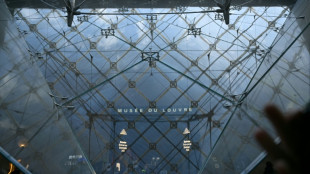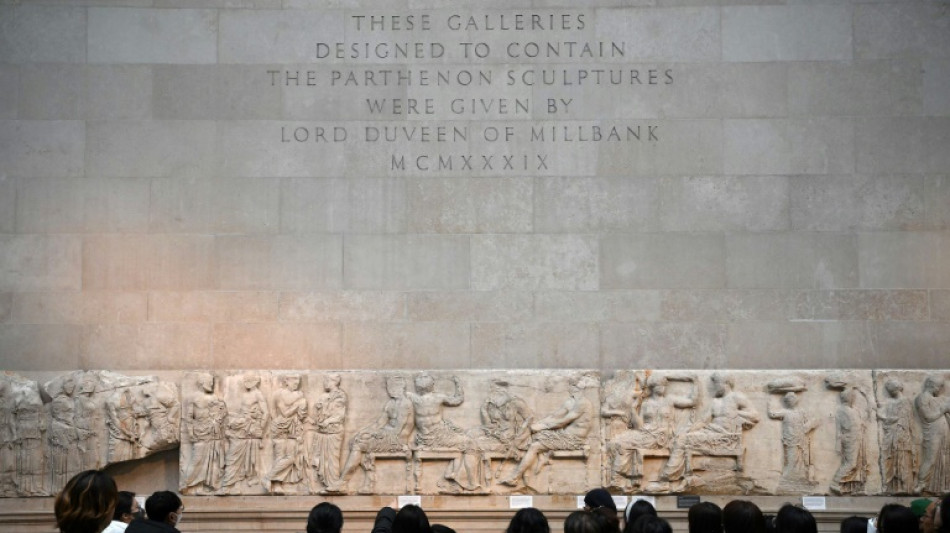
-
 Sixers rookie Edgecombe leads 'Team Vince' to NBA Rising Stars crown
Sixers rookie Edgecombe leads 'Team Vince' to NBA Rising Stars crown
-
Rubio at Munich security meet to address Europeans rattled by Trump
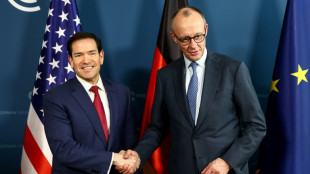
-
 Medal-winner Sato says Malinin paid for 'toxic schedule'
Medal-winner Sato says Malinin paid for 'toxic schedule'
-
Carney offers support of united Canada to town devastated by mass shooting

-
 All-in on AI: what TikTok creator ByteDance did next
All-in on AI: what TikTok creator ByteDance did next
-
Healthy Ohtani has Cy Young Award in sights

-
 One of Lima's top beaches to close Sunday over pollution
One of Lima's top beaches to close Sunday over pollution
-
'Nothing is impossible': Shaidorov shocks favourite Malinin to make history

-
 Malinin wilts at Olympics as Heraskevych loses ban appeal
Malinin wilts at Olympics as Heraskevych loses ban appeal
-
Bhatia joins Hisatsune in Pebble Beach lead as Fowler surges

-
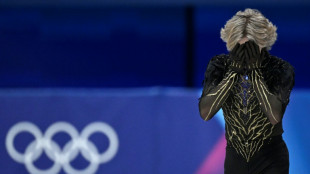 Malinin meltdown hands Shaidorov Olympic men's figure skating gold
Malinin meltdown hands Shaidorov Olympic men's figure skating gold
-
Top seed Fritz makes ATP Dallas semis with fantastic finish

-
 Patriots star receiver Diggs pleads not guilty to assault charges
Patriots star receiver Diggs pleads not guilty to assault charges
-
Havana refinery fire under control as Cuba battles fuel shortages

-
 Peru Congress to debate impeachment of interim president on Tuesday
Peru Congress to debate impeachment of interim president on Tuesday
-
Snowboard veteran James targets 2030 Games after Olympic heartbreak

-
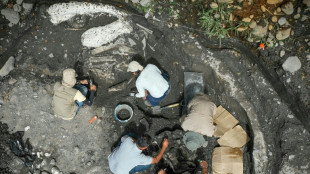 Costa Rica digs up mastodon, giant sloth bones in major archaeological find
Costa Rica digs up mastodon, giant sloth bones in major archaeological find
-
Trump says change of power in Iran would be 'best thing'

-
 Paris police shoot dead knife man at Arc de Triomphe
Paris police shoot dead knife man at Arc de Triomphe
-
Japan's Totsuka wins Olympic halfpipe thriller to deny James elusive gold

-
 Canada's PM due in mass shooting town as new details emerge
Canada's PM due in mass shooting town as new details emerge
-
Neto treble fires Chelsea's FA Cup rout of Hull

-
 Arbitrator rules NFL union 'report cards' must stay private
Arbitrator rules NFL union 'report cards' must stay private
-
Dortmund thump Mainz to close in on Bayern

-
 WHO sets out concerns over US vaccine trial in G.Bissau
WHO sets out concerns over US vaccine trial in G.Bissau
-
Skeleton racer Weston wins Olympic gold for Britain

-
 Ex-CNN anchor pleads not guilty to charges from US church protest
Ex-CNN anchor pleads not guilty to charges from US church protest
-
Berlin premiere for pic on jazz piano legend Bill Evans

-
 Fire at refinery in Havana as Cuba battles fuel shortages
Fire at refinery in Havana as Cuba battles fuel shortages
-
A Friday night concert in Kyiv to 'warm souls'

-
 PSG stunned by rampant Rennes, giving Lens chance to move top
PSG stunned by rampant Rennes, giving Lens chance to move top
-
Japan's Totsuka wins Olympic halfpipe thriller as James misses out on gold

-
 Indian writer Roy pulls out of Berlin Film Festival over Gaza row
Indian writer Roy pulls out of Berlin Film Festival over Gaza row
-
Conflicts turning on civilians, warns Red Cross chief

-
 Europe calls for US reset at security talks
Europe calls for US reset at security talks
-
Peru leader under investigation for influence peddling

-
 Rising star Mboko sets up Qatar Open final against Muchova
Rising star Mboko sets up Qatar Open final against Muchova
-
Canada PM to mourn with grieving town, new details emerge on shooter

-
 US waives Venezuela oil sanctions as Trump says expects to visit
US waives Venezuela oil sanctions as Trump says expects to visit
-
NBA star Chris Paul retires at age 40 after 21 seasons

-
 WTO chief urges China to shift on trade surplus
WTO chief urges China to shift on trade surplus
-
Vonn hoping to return to USA after fourth surgery on broken leg

-
 Trump sending second aircraft carrier to pile pressure on Iran
Trump sending second aircraft carrier to pile pressure on Iran
-
Heraskevych loses Olympics disqualification appeal, Malinin eyes second gold

-
 Mercedes have 'taken a step back': Russell
Mercedes have 'taken a step back': Russell
-
Madagascar cyclone death toll rises to 40, water, power still out

-
 Earl says England inspired by last year's Calcutta Cup
Earl says England inspired by last year's Calcutta Cup
-
USA romp past Dutch in T20 World Cup to keep Super Eight hopes alive

-
 De Minaur scraps past local legend van de Zandschulp
De Minaur scraps past local legend van de Zandschulp
-
Ukrainian Heraskevych loses appeal against Olympics disqualification


Law and politics hamper UK museum artefacts returns
British museums, like others across Europe, are under pressure to return artworks taken during the colonial era, including Bronzes from Benin, royal treasures from Ghana and friezes from Greece.
However, politicians have little appetite to change the legal framework that is currently blocking full restitutions by national museums, campaigners say.
After half a century of discussions, the British Museum and the Victoria and Albert Museum (V&A) recently reached an agreement to loan Ghana gold and silver objects from the Ashanti royal court taken during the colonial era in 1874.
The loan of these 32 pieces could last up to six years, according to the Manhyia Palace in Kumasi, seat of the Ashanti kingdom in now modern-day Ghana.
But Nana Oforiatta Ayim, special advisor to the Ghanaian government on culture, felt that the gesture was not enough.
"Someone comes in to your home, and steals something from your house, keeps it in their house, and then X amount of years later comes up and says 'I'm going to lend you your things back'. It doesn't make any sense," she told the BBC.
Some UK museums have managed to return artefacts, such as the 72 pieces -- including 12 Benin bronzes -- returned to Nigeria in 2022 by the Horniman Museum in London.
But British laws dating from the 1960s and 1980s prevent national museums, such as the British Museum and the V&A, from making such restitutions.
This is particularly relevant in the long-standing and symbolic quarrel between London and Athens over the future of the Parthenon friezes.
British authorities say the sculptures, on display at the British Museum, were legally acquired in 1802, while Greece maintains they were looted when the country was under Ottoman rule.
- Loan 'risk' -
By offering loans rather than restitution, national museums are trying to respond to demands without transferring ownership of objects, Tatiana Flessas, associate professor of law at the London School of Economics (LSE), told AFP.
But the British Museum would not "risk" lending the Parthenon marbles, "because it's completely evident that the Greeks will hold on to them," she added.
It would be possible, in theory, to change the law, said Flessas, in a similar way to how artworks looted by the Nazis were returned after WWII.
But Britain's Conservative government refuses to do so, even if public opinion is in favour.
Some 64 percent of Britons support their return, according to a YouGov poll commissioned last June by the Parthenon Project, a group that believes the marbles should reside in Greece.
Another YouGov poll in November found 49 percent in support, as opposed to 15 percent against, with the remainder either indifferent or undecided.
"The government is absolutely out of step with the rest of the population", Lewis McNaught, founder of Returning Heritage, which campaigns for restitution, told AFP.
"It is absolutely fixed on this idea that anything which removes objects from state collections is wokeish."
- Not a priority -
Opponents of restitution fear a domino effect, with cascading demands emptying British museums.
The conservative Daily Telegraph last month argued that, after the announcement of the loan of Ghanaian treasures, it was now British museums which risk being "looted".
But McNaught said that the number of objects potentially affected was limited, and would apply to less than one percent of the eight million objects in the British Museum.
"The problem is some of those items are very high profile," he added.
On mainland Europe, many countries have set up independent commissions on the issue, including Switzerland, "which never even had a colony," said McNaught.
But not the UK, which according to him remains wedded to a system created at the beginning of the 19th century.
And at the start of an election year in the UK, none of the main parties sees the issue as a priority.
"But times have changed, society has changed," he added.
P.Costa--AMWN
